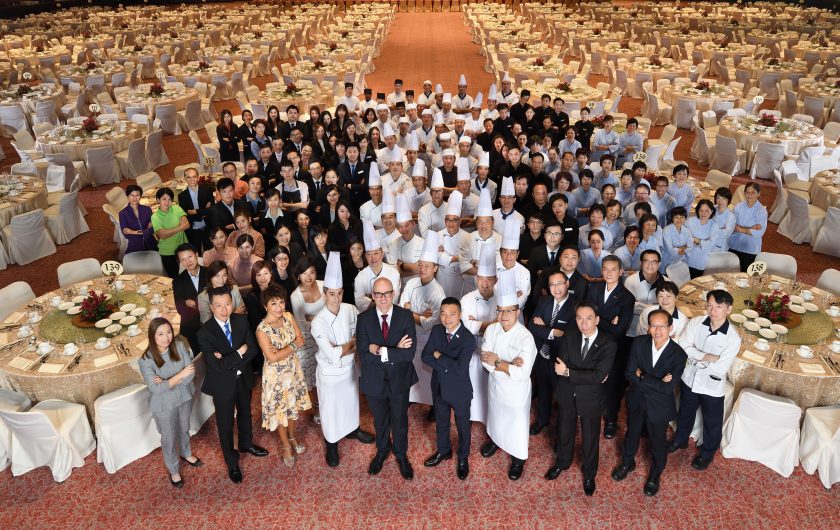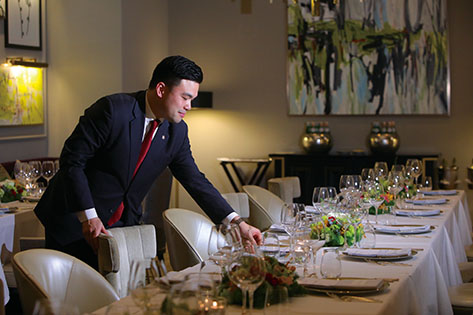PLANNERS and event organisers have a lot on their plates at the moment, with cancellations because of the coronavirus outbreak and the resulting economic uncertainties, but there is one issue that will always be vital to the wellbeing of delegates and guests – food safety, writes Steve Cray.
The dangers posed by the likes of listeria, salmonella, cyclospora and e-coli; the needs of people with food allergies or on medically determined diets; and problems caused by the annual US$50 billion food-fraud racket, can be recipes for disaster if handled badly.
There are ingredients for success, though, and many of them are on the safety and hygiene menus at some of Asia Pacific’s largest events venues.
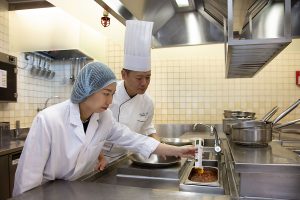
Hong Kong Convention and Exhibition Centre (HKCEC), which serves 2.2 million diners every year – including 300 banquets – and has seven restaurants and concession stands serving visitors attending exhibitions and conferences, has a professional in-house food and beverage team (main picture) of more than 300 for whom food safety is a “core commitment”.
Paul Jeffrey Chandler, HKCEC food and beverage director, says that with the high volume of food production, it’s vital for systems and processes to follow global and local safety and hygiene standards.
“We have hired a full time food safety and hygiene manager who is responsible for verifying that operations are in compliance with hygiene and food safety standards,” he says, adding that HKCEC operates stringent internal assessments to enable systematic tracking and improvement of hygiene in kitchens and other food-handling locations.
Small army at HK kitchens get recipe for success
Chandler says all F&B staff attend regular training sessions on preparing and handling food safely, and that two restaurants; Congress Plus and Harbour Road Café, last year attained HACCP (Hazard Analysis and Critical Control Point) recertification – an international recognition on food safety standards.
Every stage of food production, from purchasing, receiving, transportation, storage, preparation, handling, and cooking, to serving, is monitored scrupulously with a sound procurement and sourcing strategy in place.
Suppliers are inspected regularly to ensure they have documentation on the laboratory testing of certain products (oysters and seafood, for example).
FOOD ANGEL
Safety and hygiene is a major concern when it comes to donating surplus food, says Hong Kong Convention and Exhibition Centre’s director of food and beverage Paul Jeffrey Chandler.
HKCEC has been supporting Food Angel’s “Food Rescue Programme” – run by the Bo Charity Foundation – since 2011, by donating unconsumed items from its buffet restaurant Congress Plus, as well as inviting banquet event organisers to do the same.
Food Angel rescues edible surplus from different sectors of the food industry, preparing more than 10,000 meals and 2,000 food packs daily, free of charge.
Chandler says there are strict rules to follow when it comes to safety. “Our chefs advise which items which are suitable for donation when preparing menus. For example, cooked meat, cooked seafood, rice, fried rice, fried noodles, and pasta are suitable for donation, while cooked shellfish, cooked vegetables, soup, sashimi and dairy products are not.
“Our chefs reheat the donated food to at least 80 degrees centigrade, pack and store it in a blast chiller at minus18 to minus 22 centigrade for 30 minutes, and then keep it in a walk-in freezer,” he says.
“The food donated is carefully handled by our chefs and prepared as nutritious hot meals and redistributed to the underprivileged community in Hong Kong.”
Kosher menu meals are purchased ready made from external specialist suppliers with certified ingredients, seasoning, and cooking methods.
Chandler says a third of HKCEC’s 300 banquets are large scale, attended by upwards of 1,000 guests, and that chefs and F&B event managers spend months designing the menus. Special attention is paid to halal needs, dairy, gluten and MSG-free products, vegetarian food, and beef-free and no-shell seafood dishes.
“Kitchens implement the highest standards of preparation and hygiene. Deep cleaning of equipment is conducted before the preparation of gluten free food to avoid unexpected contact on food handling.”
Kuala Lumpur Convention Centre (KLCC) has similar training and safety protocols in place and is ISO 22000 and Hazard Analysis and Critical Control Points (HACCP) accredited, and Halal certified by the Department of Islamic Development Malaysia.

“We audit our suppliers to ensure they follow our food safety requirements under the ISO 22000 and Halal certifications, as well as undertake daily checks on our food processes in line with the HACCP certification,” says deputy general manager John Burke.
As with HKCEC, the KLCC culinary team meets clients ahead of time to understand their needs and finalise menu options, and one person is appointed in charge to handle special meals during the event.
“Labelling is important, not only for guests, but also for our chefs and service staff to help ensure that the food prepared strictly follows the special requirements and ingredients contained in the dish. Wherever necessary, we include allergen and dietary information on our buffet labels and menus to make it clearer and easier for guests to identify,” he says.
“We have standard operating procedures that form part of our daily business operations and best practice models we follow in this regard.”
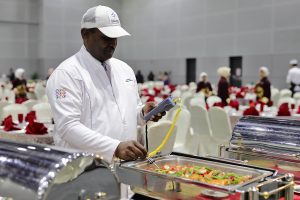
Special dishes are cooked in a separate area of the kitchen to avoid any contact with other meals, and utensils are properly sterilised to ensure there is no cross-contamination.
“Due to the increasing number of special dietary and nutritional requests, we have a menu library which we maintain, but our preference is to adopt a flexible and personalised approach and sit down with every client to better understand their needs and preferences,” Burke says.
ICC Sydney also follows Australian and international food safety practices (ISO 9001 and the ISO 22000), which include rigorous verification processes, daily production and storage area inspections, internal audits, and environmental, surface swab, and allergen detection swab tests.
Lynell Peck, ICC director of culinary services, says the kitchen has a linear workflow, which mitigates the risk of cross-contamination.
Peck says ICC’s allergen and safety controls include:
- Identifying approved suppliers to work with in the development of allergen free products;
- Dietary meal options created as part of the menu design process;
- Segregated allergen storage and production spaces;
- A comprehensive allergen matrix that captures the entirety of the menu;
- Detailed ingredients listings and product specifications created for all menu items;
- Education and training systems for culinary and front of house team members;
- Clear and identifiable signage during service periods to highlight allergen-friendly food items, and,
- A separate food service area for dietary food options.
Peck says ICC is also committed “to providing positive outcomes for regional New South Wales” and does this through its Feeding Your Performance Philosophy.

“Through our unique procurement strategy, we engage directly with almost 130 local farmers and producers, delivering direct positive impact to local communities while also serving our guests some of the finest produce from across the state,” she says.
In the absence of the opportunity to source locally, it is important to exercise “due diligence” with food suppliers, something Tom Burney, executive chef with Hong Kong-based event caterers Invisible Kitchen, knows all about.
For the company, which describes itself as a “Hong Kong’s greenest caterer” and bears the motto “make sure your next event doesn’t cost the Earth”, the careful sourcing and selection of ingredients is vital.
Burney says it is essential to use reputable suppliers and ask to see paperwork supporting sourcing claims. “I find the process of requesting these documents as telling as the actual documents. You can often tell when a supplier is uneasy about these kinds of discussions,” he says. “A genuine supplier will be happy to show you all they can [relevant to the product].”
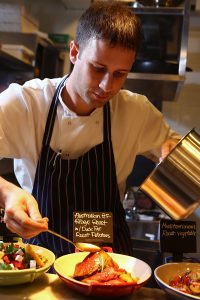
Burney says the challenge of special dietary needs is met by ensuring that one key front-of-house member of staff is well versed and knowledgeable on potential issues and special requests. “As a rule we don’t include nuts, pork or alcohol in our buffet dishes unless it’s very obvious and clear,” he says.
“Nowadays most international and large local event organisers will request allergy info to be on the food labels.
“We also often provide allergy summary cards on the table for larger buffets so guests can see an overview of what is suitable for them for the full day. We don’t include full ingredients on food labels, although I have been asked to provide this to event organisers on just a handful of occasions.”
Burney adds that a separate preparation area and utensils are used for preparing special meals and that all measures are taken to meet special requirements.
“Of course, often we will have to use the disclaimer that we cannot 100 per cent guarantee anything… we take every care possible within our operations but at the same time we are not running a hospital kitchen.”
FIGHTING FOOD-BORNE DISEASE
Around 600 million people become ill and 420,000 die each year from food-borne diseases, with losses in productivity and trade and the cost of treatment amounting to around US$110 billion annually, according to the World Health Organisation (WHO).
The most important global body for the maintenance of food standards is the Codex Alimentarius Commission (CAC), and the Codex Alimentarius, a collection of international food standards, guidelines and codes of practice, serves as the global reference point for food producers, processors, consumers, national food safety agencies and the international food trade.
The CAC is run jointly by the The Food and Agriculture Organisation of the United Nations and WHO, and comprises 188 member countries and one member organisation – the EU – and 229 observers, of which 57 are intergovernmental organisations, 156 NGOs, and 16 UN agencies.
In 2001, the International Organisation for Standardisation (ISO) started working on an auditable Food Safety Management System based on the CAC guidelines, and the standard, known as ISO 22000, was published on September 1, 2005.
Within two years, ISO 22000 had been implemented by organisations in more than 50 countries as an alternative to the many, various schemes developed by individual companies for auditing their suppliers.
